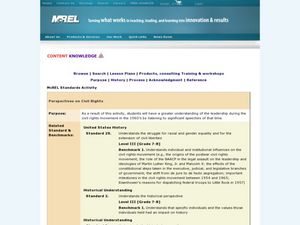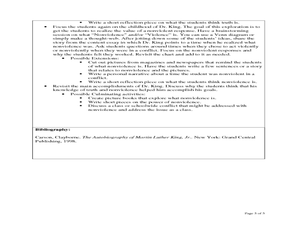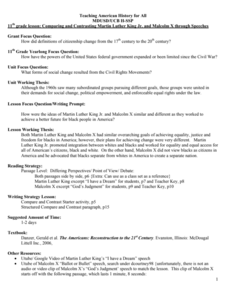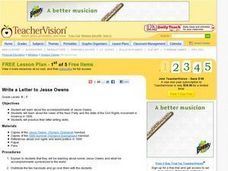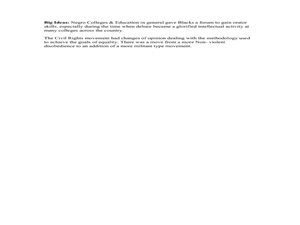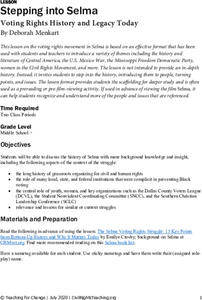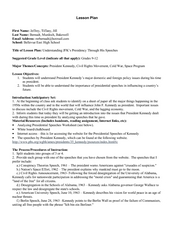DocsTeach
Responding to the Murder of Harry T. Moore
Heroic civil rights leader Harry T. Moore is murdered! An eye-opening activity delves into the past to understand the murder of prominent civil rights leader and educator Harry Moore and his wife. Academics also read President Truman's...
Curated OER
History in Literature - The House of Dies Drear
Hook your learners with a great project. They research the underground railroad and civil rights movement through literature, view the video The Underground Railroad: Escape from Slavery, and read the book House of Dies Drear in...
DocsTeach
"We Are Badly in Need of a Breath of Fresh Air": A Letter to President Kennedy About LGBTQ+ Rights
The 1960s were a pivotal time for many Americans who had long been discriminated against. Scholars read a document addressed to President Kennedy in support of LGBTQ+ rights and why they are essential. The activity includes group...
National Endowment for the Humanities
Women's Lives Before the Civil War
Women's lifestyles before the Civil War made a huge impact as a point of causation. Give middle schoolers the opportunity to view firsthand the lives of women before the Civil War. They analyze primary source documents, view photographs,...
American Institute of Physics
The Black Scientific Renaissance of the 1970s-90s: African American Scientists at Bell Laboratories
A two-part instructional activity asks young scientists to research the contributions of African American scientists at Bell Laboratories. After presenting their findings, class members watch two demonstrations that introduce them to...
Curated OER
Perspectives on Civil Rights
Learners examine speeches of the Civil Rights Era. In this American history activity, students listen to speeches delivered by Martin Luther King, Jr. and John F. Kennedy. Learners respond to guiding questions as they listen to the...
Curated OER
Laws of Civil Rights
Students investigate the Civil Rights Act of 1964. In this segregation instructional activity, students explore the rights that were guaranteed by the legislation as well as attempts by southerners to stop African Americans from voting....
Curated OER
The Art of Nonviolence: Martin Luther King, Jr., Gandhi, and Concepts of Nonviolence in Indian Art
Students make connections between nonviolent ideals and art. In this visual arts lesson, students discuss the successes of the American Civil Rights Movement and discuss Gandhi's influence on the movement. Students then examine images of...
Curated OER
Dr. Martin Luther King, Jr.: Childhood Stories of Truth and Nonviolence
Fifth graders explore the childhood of Martin Luther King, Jr. In this nonviolent resistance lesson, 5th graders listen to their instructor present a lecture regarding the details of King's early life and how that life contributed to his...
Curated OER
Art: Faith Ringgold Story Quilts
Twelfth graders examine the impact of African American culture on the United States by inspecting Faith Ringgold's story quilts. Working in groups, they create a collective story quilt about current cultural issues. They research their...
Rancocas Valley Regional High School
Teaching American History for All
Although Dr. Martin Luther King, Jr. and Malcolm X both work for equal rights, social change, and political empowerment, their approaches were radically different. To better understand these contrasts, class members compare King's "I...
Curated OER
Freedom Summer
Young scholars brainstorm and discuss what the concept of "fairness" is and how to identify examples of "fairness." They pull from historical fiction and the Civil Rights Movement to explain how individual are affected by, cope with, and...
Curated OER
Taking a Stand with Rosa Parks
Students discuss African-American history from slavery to the civil rights movement. They discuss individual people who shpaed history by reading their biographies and researching the age in which they lived. Studnets comprehend the...
Curated OER
Breaking Barriers with Melba Pattillo
Students are introduced to individuals who made the civil rights movement a success. They examine, analyze and interpret the events and people who had a significant and stirring impact on the course of history through stories, interviews...
Curated OER
Write a Letter to Jesse Owens
Students examine the accomplishments of Jesse Owens and the views of the Nazi Party in 1936. They read and discuss two handouts, conduct research on the Nazi Party's views and the Civil Rights Movement in American in 1936, and write a...
Curated OER
Civil Rights Methodology Martin Luther King, Jr. – Stokely Carmichael
Students compare and contrast the visions of Martin Luther King, Jr. and Stokely Carmichael. In this African-American history lesson, students read speeches by each of the men and summarize the arguments made by each of them about...
Curated OER
Civil Rights Leaders; Past and Present
High schoolers explore the concept of social justice. In this Civil Rights lesson, students fulfill the Rubric for Historical Research requirements as they conduct research on a Civil Rights or Anti-Apartheid Movements leader.
Teaching for Change
Stepping into Selma
The 1964 Selma to Montgomery, Alabama voting rights marches are the focus of a instructional activity designed to introduce learners to people who took part in the Civil Rights Movement. Class members set into the role of one of the...
Teaching for Change
A Documents-Based Lesson on the Voting Rights Act
How did the Voting Rights Act affect the daily lives of American citizens? A document-based lesson developed by the Student Non-Violent Coordinating committee (SNCC) presents a case study of the impact of the Voting Rights Act of 1965 on...
DocsTeach
Analyzing Jackie Robinson's White House Letter
Jackie Robinson: A hero on and off the field. An eye-opening activity focuses on Jackie Robinson's social activism during and after the civil rights movement. Academics read a letter addressed to President Nixon, answer questions, and...
Center for Civic Education
The Power of Nonviolence: What Is Nonviolence? What Does It Cost?
Your young learners will delve into the language of primary source documents in order to identify the characteristics, benefits, and costs of nonviolence. The instructional activity includes a mix of activities, including an anticipatory...
Curated OER
Understanding JFK's Presidency through his Speeches
Students reflect and discuss the major events that happened in the United States in the 1950's and 1960's. In this U.S. History lesson plan, students read and analyze the famous speeches during this time frame, then complete a...
DocsTeach
Confronting Work Place Discrimination on the World War II Home Front
Before the Civil Rights Movement was in full swing, FDR's executive order helped promote fair employment. The activity uses primary documents to explore FDR's executive order to help minorities gain equal employment and pay during the...
PBS
Breaking the Code: Actions and Songs of Protest
Ezell Blair, Jr., David Richmond, Franklin McCain and Joseph McNeil changed history. Their sit-in at the lunch counter of the Woolworths in Greensboro, North Carolina on February 1, 1960 became a model for the nonviolent protests that...







